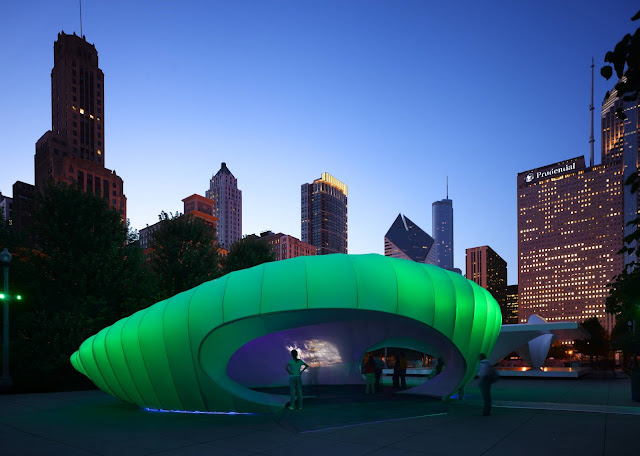A
ZAHA HADID BURNHAM PAVILION / CHICAGO - USA
B
B
ZAHA HADID BURNHAM PAVILION / CHICAGO - USA
Zaha Hadid Architects’ pavilion design for Chicago’s Burnham Plan
Centennial celebrates the city’s ongoing tradition of
bold plans and big dreams. The Project encourages reinvention and
improvement on an urban scale and welcomes the future with innovative ideas and
Technologies whilst referencing the original organizational systems of
Burnham’s plan. Our design continues Chicago’s renowned tradition of cutting
edge architecture and engineering, at the scale of a temporary pavilion. The
design merges new formal concepts with the memory of bold historic urban
planning. Superimpositions of spatial structures with hidden traces of
Burnham’s organizational systems and architectural representations create
unexpected results. By using methods of overlaying, complexity is built up and
inscribed in the structure. The pavilion is composed of an intricate
bent-aluminum structure, with each element shaped and welded in order to create
its unique curvilinear form. Outer and inner fabric skins are wrapped tightly
around the metal frame to create the fluid shape. The skins also serve as the
screen for video installations to take place within the pavilion. Zaha Hadid
Architects’ pavilion also works within the larger framework of the Centennial
celebrations’ commitment to deliberate the future of cities. The presence of
the new structure triggers the visitor’s intellectual curiosity whilst an intensification
of public life around and within the pavilion supports the idea of public
discourse. The pavilion was designed and built to maximize the recycling and
re-use of the materials after its role in Millennium Park. It can be
re-installed for future use at another site.
B
AA
ZAHA HADID
Zaha Hadid, founder of Zaha Hadid Architects, was awarded
the Pritzker Architecture Prize ( considered to be the Nobel Prize of
architecture) in 2004 and is internationally known for both her theoretical and
academic work. Each of her dynamic and innovative projects builds on over
thirty years of revolutionary exploration and research in the interrelated
fields of urbanism, architecture and design. Hadid’ s interest lies in the
rigorous interface between architecture, landscape and geology as her practice
integrates natural topography and human – made systems , leading to
experimentation with cutting – edge Technologies. Such a process often results
in unexpected and dynamic architectural forms.
EDUCATION
Hadid studied architecture at he Architectural Association
from 1972 and was awarded the Diploma Prize in 1977.
TEACHING
She became a partner of the Office for Metropolitan
Architecture, taught at the AA with OMA collaborators Rem Koolhaas and Elia
Zenghelis, and later led her own studio at the AA until 1987. Since then she
has held the Kenzo Tange Chair at the Graduate School of Design, Harward
University; The Sullivan Chair at the University Illinois, School of Architecture,
Chicago; guest professorsships at the Hochschule für Bildende Künste in
Hamburg; The Knolton School of Architecture, Ohio and the Masters Studio at
Columbia University, Newyork. In addition, she was made Honorary Member of the
American Academy of Arts and Letters, Fellow of the American Institute of
Architecture and Commander of the British Empire, 2002. She is currently
Professor at the University of Applied Arts in Vienna, Austria and was the Eero
saarinen Visiting Professor of Architectural Design at Yale University, New
Haven, Connecticut.
AWARDS
Zaha Hadid’ s work of the past 30 years was the subject of
critically – acclaimed retrospective exhibitions at New York’ s Solomon R.
Guggenheim Museum in 2006, London Design museum in 2007 and the Palazzo della
Ragione, Padua, Italy in 2009. Her recently completed projects include the
MAXXI Museum in Rome; which won the Stirling award in 2010. Hadid’ s
outstanding contribution to the Stirling award in 2010. Hadid’ s outstanding
contribution to the architectural profession continues to be acknowledged by the
most world’ s most respected institutions. She received the prestigious ‘
Praemium Imperiale ’ from the Japan Art Association in 2009, and in 2010, the
Stirling Prize from the Royal Institute of British Architects. Other recent
awards include UNESCO naming Hadid as an ‘ Artist for Peace ‘ at a
ceremony in their Paris headquarters last year. Also in 2010, the Republic of
France named Hadid as ‘ Commandeur de l’ Ordre des Arts et des Lettres’ in
recognition of her services to architecture, and TIME magazine included her in
their 2010 list of the ‘ 100 most Influential People in the World ‘. This years
‘ Time 100 ‘ is divided into four categories: Leaders, Thinkers, Artist and
Hereos – with Hadid ranking top of the Thinkers category.
ZHA PROJECTS:
Zaha has played a pivotal role in a great many Zaha Hadid
Architects projects over the past 30 years. The Maxxi National Museum of 21 st
Century Arts in Rome, Italy; the BMW Central Building in Leipzig, Germany and
the Phaeno Science Center in Wolfsburg, Germany are excellent demonstrations of
Hadid’ s quest for complex, fluid space. Previous seminal buildings such as the
Rosenthal Center for Contemporary Art in Cincinati, USA, have also been hailed
as architecture that transforms our vision of the future with new spatial
concepts and bold, visionary forms.
Currently Hadid is working on a multitude of projects
worldwide including: The London Aquatics Centre fort he 2012 Olympic Games;
High – Speed Train Stations in Naples and Durango; The CMA CGM Headquarters
tower in Marseille; The Fiera di Milano masterplan and tower as well as major
master planning projects in Beijing, Bilboa, Istanbul and Singapore. In the
Middle East, Hadid’ s portfolio includes national cultural and research centres
in Jordan, Morocco, Algeria, Azerbaijan, Abu Dhabi and Saudi Arabia, as well as
the new Central Bank of Iraq.
You may visit Zaha Hadid Architects’ projects, design and exhibitions news; Crest at
Victoria & Albert Museum, Dongdaemun Design Plaza, , Unique Circle,
Serpentine Sackler Gallery, Parametric Space, Heydar Aliyev Center, Serac
Bench, The Collins Park Garage, Maxxi Museum, to click below links from my blog
archive.
http://mymagicalattic.blogspot.com.tr/2014/09/crest-design-by-zaha-hadid-architect-at.html


























